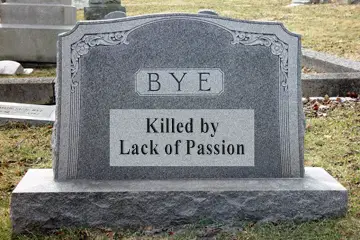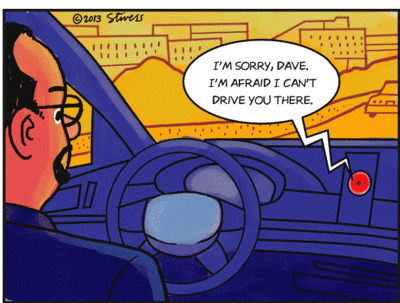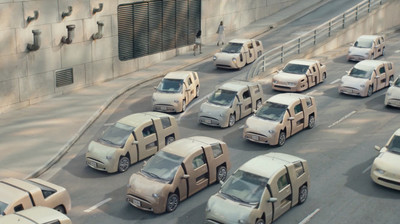Autonomous Driving May Kill The Automobile Industry And American's Freedom (Originally Published 11/26/2015)
 |
Without Performance and Personality Differentiation Say Goodbye To The Public's Love Affair With The Automobile
By Marc J. Rauch
Exec. Vice President/Co-Publisher
THE AUTO CHANNEL
Originally published November 26, 2015
Updated September 10, 2018
 Marc Rauch |
Early this morning, Mercedes-Benz staged a world premiere from Copenhagen of their "Vision Urbanetic" adVANce initiative. They call it their "holistic solution for intelligent urban mobility." In short, it's their view of how autonomous passenger and cargo vans will operate in the near future. This presentation is a continuation of how they see the automobile and transportation worlds down the road (pun intended). The MB vision was initially stated almost exactly three years ago.
In his opening remarks at the 2015 Frankfurt Motor Show, Dieter Zetsche (Mercedes-Benz CEO), prophesied: "The Mercedes of the future will drive not only with zero emissions but also autonomously." This sentiment and intention has been unanimously proclaimed - more or less - by all automaker executives and futurists.
Personally, I don't believe that autonomous open road driving will ever become commonplace. I think that technology will never advance to a point where it is safe enough to replace automobile driving as we have known it for the last 100 years - at least it won't happen in our lifetime or in our children's lifetimes.
• SEE ALSO: The Silicon Valley Crowd Is On Their Way To Appliance-ize Cars (And The Need For Your Company)
However, if and when it ever does come to pass, the auto industry pre-occupation and zeal to invent and implement autonomous driving solutions may very well destroy their industry.
Simply put, there is no public love affair with subways and commuter trains, or buses, or taxi cabs, or moving walkways. People may appreciate what subways, buses, taxis, and moving walkways can do for them, but there is no love affair with the conveyances themselves. Flying on commercial airlines has also lost all of its glamour and thrill. Sure, there are people who love flying, when they are actually flying a plane, but people are increasingly bored and annoyed at the mundane experience of sitting in a cramped seat for multiple hours. The only excitement ever generated when flying on a commercial airline comes from the prospect of traveling business class or first-class because of comfort - but no passenger can honestly love the flying experience.
• SEE ALSO: Bloomberg Catches Up With The Auto Channel
Other than the nerdiest of bus and train geeks, no one cares who makes them. Knowing who manufactures standard taxi cabs isn't even worthy of a Trivial Pursuit question; and the same can be said for the identity of a commercial airplane's manufacturer. The overwhelming majority of passengers don't select an airline based upon whether its planes are made by Boeing or Airbus; it's just a conveyance.
The automobile industry is in danger of the same irrelevancy, if autonomous driving becomes the norm. In an autonomous driving world it will be immaterial if a vehicle's engine is made by Mercedes or BMW or Toyota or General Motors. Car speeds will be regulated; 0-60 will be a non-issue; handling will be inconsequential. There will be no passion for performance; and without the thrill of personal performance, driving and owning your own vehicle will be just another dreary, monotonous everyday event.
Brand differential will be eliminated.
In an electric autonomous driving world - or I should say, electric autonomous 'passenger' world - your preferences will be limited to selecting the size of the vehicle (small, medium, large, larger) and then selecting which "furniture" package you want for the interior. With brand differential gone, one company could build all the chassis and motors, and one company could build all the exterior shells.
Be careful of what you wish for and obsess over, auto industry, you may shoot yourself in the foot, er, I mean, tire.
The following is what my business partner, Bob Gordon, and our team of automotive journalists think about this issue. If you'd like to chime in please send us an email. Yu'll find our email addresses on the "contacts" page.
 |
By Bob Gordon
Co-Founder and Street-Kid Visionary
The Auto Channel
Autonomous Autos Will Give Bad Guys The Power To End Our Freedom To Go Where We Want When We Want To
Think This Can't Happen? Think Again: The Beginning Of The End Of Our Freedom Of Mobility - New Autonomous Vehicle Platform Connects Road Authorities with Vehicle Operators
Imagine a few years down the road.....
....The twenty year countdown to Autonomous Auto Day is quickly drawing to a close, hard to believe that it had been so many years since the historic centers of the automobile industry moved from cities like Detroit, Windsor, Nashville, Louisville, Tupelo, Tokyo, Seoul, and Munich, to America's Silicon Valley, which now includes everything from San Diego to Seattle, and San Francisco is the center of the Autonomous Auto World (interesting, a city that historically shunned the automobile is now the heart of the industry).
During the twenty year countdown every glitch and bug has been eliminated from the 3D-printed vehicles, while "smarts" were added to every road in the U.S., so as to be ready for AA Day.
When AA Day hits, every paved road in North America is ready to accept 100% AA Day vehicles; vehicles that do not need or want any human intervention...none, zilch, nada. Not only will every certified AA Day vehicle be self sufficient in riding, driving, and navigating, they will be self-powering and self-healing, and will have the power and intelligence to swifty become the gatekeeper of every American's freedom of mobility.
After AA Day every non-autonomous vehicle will be banned from America's roads, highways and byways...and the owners of "almost" AA Day certified vehicles will have to get their systems updated to AA Day compatible, because if they aren't they will have to sold to be exported to non-AA Day countries, or kept in museums or featured in amusement parks or private drive preserves that featured a few roads with old fashioned stop lights and speed limits. Grandparents will entertain their grandchildren with stories of what it was like to drive where and when you wanted to and physically steer, brake, and manually accelerate at your own pace. They'll tell stories about how a company named BMW described their vehicles as the "ultimate driving machine." what's driving grandpa?
Can the above really happen?...yes it can, and when it does there will be no need for consumers to differentiate cars, except for size and interior design. By Law all AA Day vehicles on the roads will have to blend-in - so why would any of those AA Day vehicles need superior horsepower, or special handling and driving capabilities...they wouldn't. The digital companies will design and contract for non-branded vehicles that meet their AA Day specs. A single corporation with the power to end freedom of movement, talk about the potential for absolute control of the American people, I ask, what was so important that Americans and others freely gave up the freedom to travel where and when they wanted to without having permission from Big Brother.
Eventually, as time passes further, the need for privately owned vehicles would disappear as the public relies more and more on ride services. If you want to go somewhere you'll push a button and in the time it takes to put your on shoes and jacket, and give your wife or husband (or both) a peck on the cheek, an autonomous Apple or Google conveyance will be at your front door. Does being able to play the newest iteration of angry birds while riding to work be a fair exchange for not having to actually drive? Not to me!
Steve Purdy
I disagree that we won’t see open road autonomous driving in our kids’ lifetime, though we probably will not see it in ours. But it is more an issue of infrastructure than automobile design in this first stage. I can easily envision driving to our kids’ house in the western suburbs of Chicago along major freeways in autonomous mode most of the way. I can’t envision a time when the supporting infrastructure will extend all the way to their house on a quiet street in their small town. I also don’t see that kind of infrastructure getting us around in far away rural areas.
There will come a time, I believe, in our grandkids’ lifetime when the autonomous systems will be so sophisticated that the infrastructure will matter less. GPS and systems that can read surroundings so accurately they won’t need the pavement lines will allow us (our grandkids, that is) to go anywhere in autonomous mode. But I don’t think that will necessarily mean homogenous design and no more creativity. It may, but I don’t think we can definitively predict that.
Even toasters are subject to good design. Our culture will decide that. Will people value unique designs? Only time will tell.
The issue that may be more important to automakers is the how the ownership model might develop. That is probably another op-ed.
Cary Russ
Big question is how much of the push for autonomous vehicles will be by government...for our own safety, of course…or at least our tax payments. And just how perfect are the control systems? There are bugs in *all* software, and not all possible use scenarios can be foreseen. I used to be on that side of things when systems were far simpler and I'm goddamn glad not to be there now.
Outsourcing thinking in any form is never a good idea, but if technology can make the incompetent pretend they're skilled geniuses, it'll sell big time. See stability control systems for details. Yeah, they save lives and property damage and good for that, but just means less driver education is needed. Everybody nose edumacated peeple don't vote for slimy politicians (of any alleged party). But hey, if Peter Plutocrat can afford a $$$$$$ Ferrari, he's obviously capable of driving it as fast as possible, right?
Yeah, like the 16 year old squid who bought a 180-mph Hayabusa as his first bike and reduced it and himself to poor sculpture on the wall on the other side of the dealer's parking lot…
And lets not forget that by turning our cars into mobile electronic devices we're shooting ourselves in the foot, if not leg, or head. "Inherent obsolescence" is the name of the racket there -- it's obsolete before you can even buy it. And un-repairable and un-restorable. Try finding batteries for cameras like the Nikon F5 -- no longer exist, you either used a heavy AA pack or throw it away. My early 70s Fs don't have that problem and will likely out-live me and the next few owners. Even more so for the 30s Leicas. But that's the thinking of a (poor) old man, not the spoiled-brat trust-fund babies who are the target of today's marketeers. F'ing dipshits (marketing twits and dumb kids).
The lessening of enthusiasm for cars is probably a good topic for a sociology thesis, although given the PC nature of academia I doubt that that would fly*. These is evidence that kids today don't care about driving. Understandable, what's exciting about bland appliances? No Driver's Ed in schools, and cars are expensive and student debt onerous. Why is poor education now so expensive? But that's another rant…
Pre-electronic cars and motorcycles are already rapidly "appreciating" and will continue to do so until outlawed. To "save the Earth" and save us from ourselves of course. Save the Earth? Hmm, the 900-pound gorilla here is not necessarily Infernal Combustion -- how about 7 F'ING BILLION humans and an ever increasing number of such in extreme poverty and desperation due to lack of resources related to overpopulation and politics. And the odd Middle Eastern death cults… current crap is just the tip of that iceberg. Welcome to World War IV... III was the Cold War, in my opinion.
* I first heard the term in the mid-80s and it was leftist-extremist bull then. I'm a liberal, but a rational one and don't buy anyone's party line. Or to quote the late, great Walt Kelly's character Pogo, "I'm an extremist of the extreme middle". 90º from the political continuum. Politicians are specious parasites. Political Correctness has always been liberal totalitarianism. Pigs is pigs, folks. Now we have "cultural appropriation"?!? Give me a break -- that's how cultures evolve and develop. If I like your idea, I'm using it. And then modifying it. Everybody does it. Did you get your widdle feewings hurted? Boo f'ing hoo -- higher education is *supposed to* expand your horizons and make you think. It's not necessarily comfortable. And anyone who claims to know The Truth is lying.
When Technolo-G™ has replaced all need for humans, what are 7+ billion humans going to do? Sit down quietly and die? Not bloody likely. What will happen will likely be bloody…
No drugs other than caffeine were taken in the production of this rant. I only channel HST after working hours. :)
 Here's what Nicholas piloted yesterday. |
Nicholas Frankl
I totally agree with your sentiments especially about cars and planes. Just yesterday I was flying and driving with my father. And there I was complaining that the 675LT isn't "emotional" & noisy enough!! Ha ha. If you're not piloting the machine there is no passion. Google car and Uber autonomy are not for me.
I suggest that people buy cars with character now - preferably manual versions - because all the turbos and gizmos are extinguishing the fun factor, which shouldn't be confused with the speed factor, which is greater than ever.
Larry Nutson
I have a few thoughts on the subject of self-driving or autonomous cars. I agree that open road driving will not happen here in the U.S. anytime soon. I can see self-drivers in confined, controlled communities wherein they are only used within the perimeter and not outside. Two that come to mind, for example, are Bay Harbor in Northern Michigan and Balboa Island in Newport, CA. These are confined residential communities with shopping, recreation and dining venues. The autonomous cars will be nothing more than "personalized or private-use community transportation."
Note that the Google autonomous cars today go no faster than 25mph. The recent issue of the traffic stop of a Google car for impeding the flow of traffic…driving 25 mph in a 35 mph zone... exemplifies that we who drive ourselves will not accept being slowed down getting from A to B.
Not every vehicle will be self driving.
Large cities like Chicago, where I live, with its 30-mph city speed limit would be choked up by self-driving cars trying to negotiate with other cars, taxis, trucks, buses, motorcycles, scooters, emergency vehicles, bicycles, pedestrians, and joggers who run in front of you, and so on. Google has acknowledged that they have a challenge to design software in a car that can't see or detect hand or eye signals from a human.
As for over the road, our interstate system is not designed for autonomous cars. We have too many two lane highways. I say that because I think a third lane will be necessary for this to function. Keep in mind that these self-drivers will be designed and programmed to never break a traffic law. Also note that not every one will have one. To wit, the average age of cars on the road today is approaching twelve years.
Now let's suppose we had three lanes of interstate from Chicago to Indianapolis. One lane for trucks, one lane for human-driven cars and one lane for the "caravaning" of autonomous cars ONLY. Instead of me driving a car I own, or a Zip car or Enterprise rental, I could rent a self-driving car. It gets to me somehow at my home; we load up and get in; we do whatever we like as the car does the driving to Indianapolis. So, will I care what this car look like. No. Just like I don't care what the bus or train or airplane looks like.
Industry experts and those very much in the know say we will have self-driving car on the road in three or some say as soon as two years. We'll see. Perhaps yes, we will in a very controlled environment. But, certainly not wide spread and not traveling at any speed above 25 mph.
We haven't touched the legal issue. Who is responsible for the decisions a self-driving car makes in an emergency situation? Who dies?
Martha Hindes
Go back a couple of decades when the internet was just growing legs and PCs were the only computers vulnerable to an occasional virus attack. At the time, no one seemed interested in corrupting Macs.
Today, with our infinitely more complex, turgid and ubiquitous computers, smart phones, tablets and even credit cards living in online visibility, virtually no system is safe from attack -- worldwide. And it isn't getting any simpler or easier to avoid or control those invasions.
What the industry needs is someone in Hollywood doing a couple of futuristic flicks about the perfect way to assassinate a dignitary via cyber attack while making it look like a software glitch or system failure, or a runaway vehicle being sent into a moving train. (I won't call it science fiction because its too quickly approaching fact.)
And with auto companies turning their code proofreading over to folks in such places as China and India, they are setting themselves up for cyber attacks on a scale we can't even comprehend.
I see two industries capitalizing and blooming because of so-called autonomously driven vehicles and neither will pad the balance sheets of car companies. Those are the legal and cyber security industries.
Just a footnote. A 17-year-old in my family who previously had zero interest in automobiles has, since getting his driver's license, been turned into a total car junkie. Maybe what we really need are areas with some roads that ban autonomously driven vehicles. Like going to a carnival with dodge-em car corrals, but on a huge scale.
Dan Poler
A couple of thoughts -
When I'm not writing (which is to say, all of the time lately - sigh), I work for a software company. Our software is everywhere: From refrigerators to vast portions of the Internet to, in fact, cars - the Tesla Model S is powered by Ubuntu.
To the point of Martha and others, it's impossible to completely eliminate risk. We take calculated risks every day by driving, flying, cooking a turkey, and we understand those risks and make the choice to undertake those activities. Generally the key to mitigation of risk is money - the more you spend, the less risky you can make something, so you spend just as much as you need to not eliminate risk, but to mitigate it to a threshold you decide is important for a business. This will be the challenge for the manufacturers of autonomous cars, particularly as regarding the software and sensor technologies. What's the acceptable level of risk, how do you apply your spending to get to that level, with the aim of not being sued or controlling damages when something goes awry (which, we all know, will happen, and will happen in ways we haven't even thought of). Until this question can be addressed and there's an acceptable trade-off, autonomous cars will not make it to market.
We Americans love our freedom and individualism, and driving ties into that. I would expect to see viable solutions first in other parts of the world - parts of Asia and Europe, I would think, before the USA.
One final thought - in addition to working in technology, I'm a gadget guy. I love consumer technology, computers, etc. But I still use a paper notebook; I am terrible at typing for notes, and I find my memory of something is better through the act of committing a pen to paper. I also just enjoy it. My point being that driving is the same - my view is not only am I going to be better at driving myself until proven otherwise, I also have to be shown that in some way allowing the vehicle to drive for me allows me in some way to derive enjoyment from it as I do driving myself. I suspect I am far from the only one with this perspective.
Safety now, self-driving later
Keith Crain
Editor-in-chief
Automotive News.
Detroit March 25, 2019; I have no idea how long it will take for a safe, fully autonomous vehicle to enter production. I am sure that it will take a lot longer than the experts are predicting.
But in the meantime, the industry is developing a large number of lifesaving devices and features, such as automatic braking, that are available on some vehicles.
When you consider how many people are killed in crashes in which a car runs into something such as a tree or another vehicle at a high speed, it's clear the addition of automatic braking could save thousands of lives every year.
More vehicles are being sold with automatic braking either standard or as part of optional safety packages, but it should be on every vehicle sold in America.
If the government can mandate backup cameras, then it should be able to go beyond the industry's voluntary agreement to roll out automatic braking and mandate the technology as soon as possible.
Competition to develop and market a truly autonomous vehicle is fierce. To be able to produce something that can operate fully autonomously under all circumstances will no doubt take a decade or longer.
But on the trail to that objective, there are plenty of lifesaving additions that should be a part of every vehicle sold. The industry should be able to take advantage of all the new safety devices and features as they are validated. The driving public should not have to wait for a fully autonomous vehicle to get a taste of these technologies.
The development of a fully autonomous vehicle will be a gigantic step forward. But it will not happen overnight, which is one of the reasons why testing should be done at safe, reliable proving grounds to avoid inevitable malfunctions.
We don't want to see those mistakes happening on public streets and highways.
Autonomous vehicles will be revolutionary when they are perfected. Until then, it makes sense to keep them confined to the test track. Meanwhile, all of the individual safety devices should be made available to the driving public once they are proved worthy.



